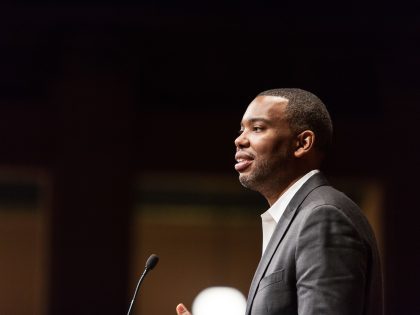
More French than Algerian
This week, Kamel Daoud became the first Algerian to receive France’s most prestigious literary honor. Yet, in Algeria, no one seems to care.

This week, Kamel Daoud became the first Algerian to receive France’s most prestigious literary honor. Yet, in Algeria, no one seems to care.

An eye-opening documentary on African literary titan Wole Soyinka wants us to laud his “politics” without ever having Soyinka himself talk about them.

The debacle around Ta-Nehisi Coates' latest book shows us that no matter a writer's individual acclaim, the liberal media establishment will never tolerate anything that fundamentally challenges its racist edifice.

African contributions to the globalized world cannot be celebrated while the place occupied by African peoples remains on the periphery.

A contribuição africana no mundo globalizado não pode ser celebrada enquanto o lugar ocupado pelos povos africanos for o da periferia.

A new biography of former apartheid homeland leader Lucas Mangope struggles to do more than arrange the actions of its subject into a neat chronology.

How did microfinance become a craze championed by bleeding-heart progressives to Global South economists, American presidents, and business executives?

Siddhartha Deb’s latest book asks readers to consider incarceration as both a metaphor and fact of life in India today.

Amid the turmoil of the Anglophone Crisis in Cameroon, a unique group of individuals has emerged as powerful agents of change.

At the height of African decolonization, radical writers turned to interactive features like competitions and quizzes to engage their audiences.

Nigeria's archives of revolutionary printmaking offers us insights into the dissident voices of the country's old left, which are surprisingly relevant today.

In 'Revolutionaries’ House,' Nthikeng Mohlele explores the moral decay within South African politics through a disaffected politician tortured by his personal indiscretions.

Christian theology was appropriated to play an integral role in the justifying apartheid’s racist ideology. Black theologians resisted through a theology of the oppressed.

The coterie of billionaires and foreign aid agencies intent on transforming African agriculture have mostly upturned people’s lives.

The film adaptation of Percival Everett's novel ‘Erasure’ leaves little room to explore Black middle-class complicity in commodifying the traumas of Black working-class lives.

We hardly think of children as agents of change. At the height of 1980s apartheid repression in South Africa, a group of activists did and gave them the tool of print.

If the savannas of West Africa are a new corporate mining frontier in the 21st century, it's because it is also home to the world’s longest-standing indigenous gold mining economy.

Tadiwa Madenga’s latest book offers us a biographical portrait of Zimbabwean author Yvonne Vera written through her love of plants, gardens and nature.

A new book argues for the centrality of Congolese elites and regional powers in perpetuating domestic conflict, but it too easily lets the West off the hook.

What does it mean to be Malawian?